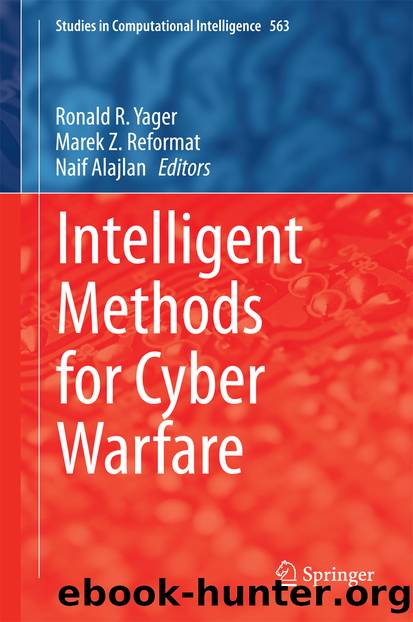Intelligent Methods for Cyber Warfare by Ronald R. Yager Marek Z. Reformat & Naif Alajlan

Author:Ronald R. Yager, Marek Z. Reformat & Naif Alajlan
Language: eng
Format: epub
Publisher: Springer International Publishing, Cham
2.4 Ontological Data
DIF processes and algorithms have historically been developed in a framework that has assumed the a priori availability of a reliable body of procedural and dynamic knowledge about the problem domain; that is, knowledge that supports a more direct approach to temporal reasoning about the unfolding patterns of interest in the problem domain. In COIN and other complex problems, such a priori and reliable knowledge is most often not availableâthe Tactics, Techniques and Procedures (âTTPâsâ) of modern-day adversaries are highly adaptive and extremely hard to model with confidence. The US DARPA COMPOEX Program [5] attempted to develop such models but only achieved partial success, experiencing gaps in the overall modeling space of such desired behavioral models. We label these types of problems as âweak knowledgeâ problems, implying that only fragmentary a priori behavioral model type knowledge is available to aid in DIF based reasoning, inferencing, and estimation.
Ontological information however, that does not attempt to overtly form such comprehensive behavioral and temporal models but does include temporal primitives along with structural/syntactic relations among entities, can be specified a priori with reasonably good confidence, and thus provides a declarative knowledge base to support DIF reasoning and estimation. Note that such knowledge is also represented in language and is available as digital text, in the same way as data from messages, documents, Twitter, etc. The use of ontological information in DIF systems can be varied; ontological information can augment observed data, can aid in asserting possible relationships, help in directing search and also in sensor management (to acquire expected information based on ontological relations), and yet other ways. Importantly, specified ontologies can also serve as providing consistent and grounded semantic terminology for any given system. In our current research, we employ ontologies primarily for augmenting observational data with asserted ontological data whose relevance is algorithmically determined using âspreading activationâ and then integrated to enrich the evidential basis for reasoning [6]. The broader implications of ontologies for intelligence analysis are described in [7], that comes from our universityâs National Center for Ontological Research (see http://ncorwiki.buffalo.edu/index.php/Main_Page).
Download
This site does not store any files on its server. We only index and link to content provided by other sites. Please contact the content providers to delete copyright contents if any and email us, we'll remove relevant links or contents immediately.
| Automotive | Engineering |
| Transportation |
Whiskies Galore by Ian Buxton(41993)
Introduction to Aircraft Design (Cambridge Aerospace Series) by John P. Fielding(33115)
Small Unmanned Fixed-wing Aircraft Design by Andrew J. Keane Andras Sobester James P. Scanlan & András Sóbester & James P. Scanlan(32789)
Craft Beer for the Homebrewer by Michael Agnew(18235)
Turbulence by E. J. Noyes(8040)
The Complete Stick Figure Physics Tutorials by Allen Sarah(7362)
The Thirst by Nesbo Jo(6930)
Kaplan MCAT General Chemistry Review by Kaplan(6926)
Bad Blood by John Carreyrou(6610)
Modelling of Convective Heat and Mass Transfer in Rotating Flows by Igor V. Shevchuk(6432)
Learning SQL by Alan Beaulieu(6280)
Weapons of Math Destruction by Cathy O'Neil(6264)
Man-made Catastrophes and Risk Information Concealment by Dmitry Chernov & Didier Sornette(6003)
Digital Minimalism by Cal Newport;(5749)
Life 3.0: Being Human in the Age of Artificial Intelligence by Tegmark Max(5545)
iGen by Jean M. Twenge(5408)
Secrets of Antigravity Propulsion: Tesla, UFOs, and Classified Aerospace Technology by Ph.D. Paul A. Laviolette(5364)
Design of Trajectory Optimization Approach for Space Maneuver Vehicle Skip Entry Problems by Runqi Chai & Al Savvaris & Antonios Tsourdos & Senchun Chai(5063)
Pale Blue Dot by Carl Sagan(4996)
